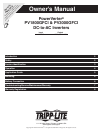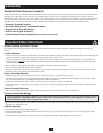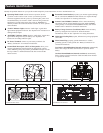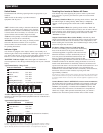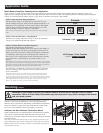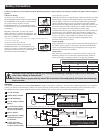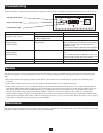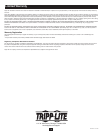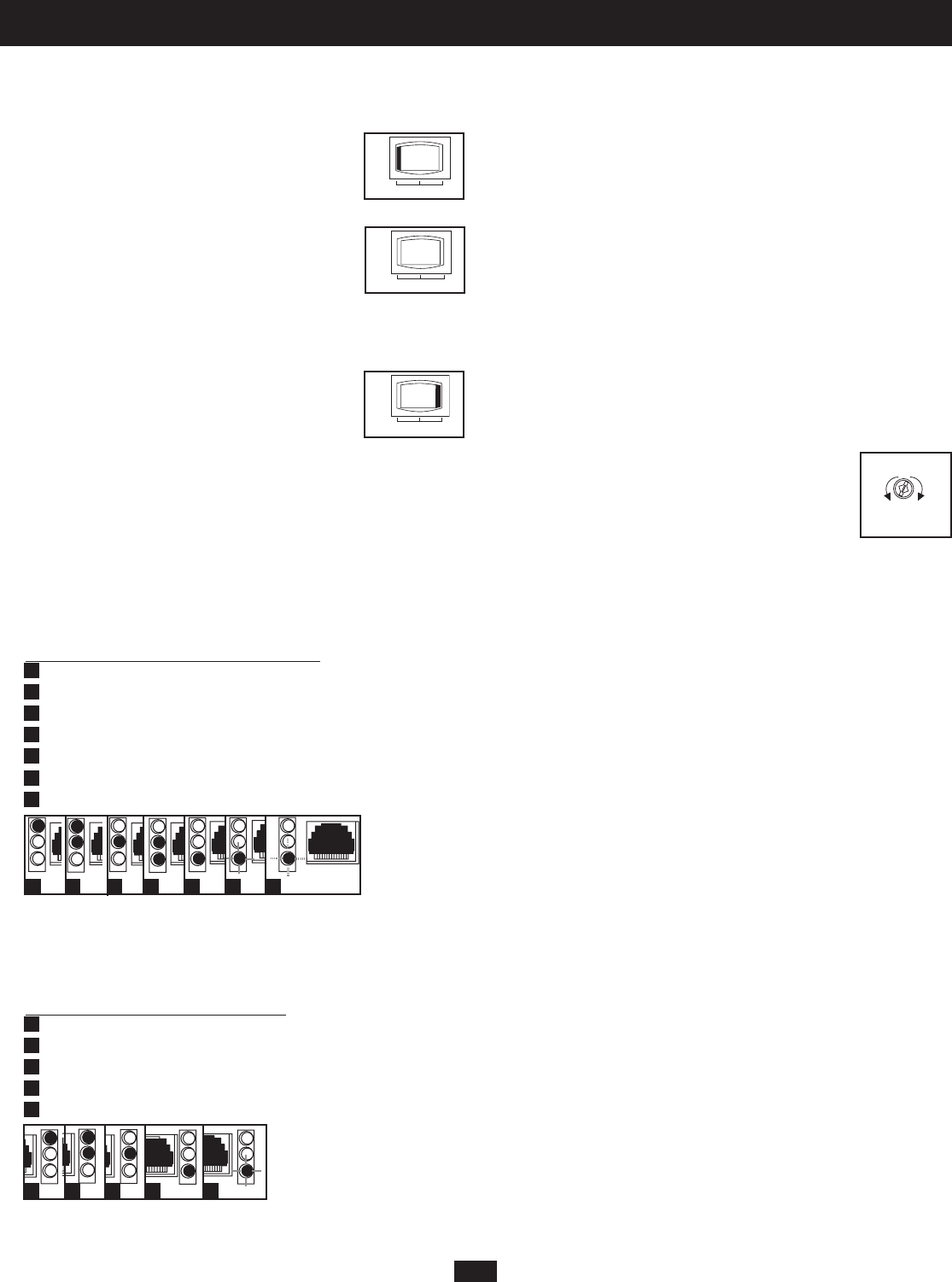
4
Operation
Switch Modes
Switch between the following operating modes as appropriate to your
situation:
“ON”: Switch to this setting to provide connected
equipment with AC power.
“OFF”: Switch to this setting to shut down the Inverter
completely, preventing it from drawing power from the
batteries. Use this switch to automatically reset the unit
if it shuts down due to low battery or overload. Use an
optional remote control module (Tripp Lite model
APSRM4, sold separately or included with PV3000HF
models) to reset unit due to overload only.
“REMOTE”: Switch to this setting to remotely monitor
and control the Inverter with the use of an optional
remote module. See remote module’s owner’s manual
for operating instructions.
Indicator Lights
Your Inverter is equipped with a simple, intuitive, user-friendly set of
indicator lights. These easily-remembered “traffic light” signals will allow
you, shortly after first use, to tell at a glance the charge condition of your
batteries, as well as ascertain approximate equipment load level.
“BATTERY” Indicator Lights: These three lights will illuminate in
several sequences to show the approximate charge level of your connected
battery:
Approximate Battery Charge Level†
Indicator Illuminated Battery Capacity
1
Green 91%–Full
2
Green & Yellow 81%–90%
3
Yellow 61%–80%
4
Yellow & Red 41%–60%
5
Red 21%–40%
6
Flashing Red (slowly)* 1%–20%
7
Flashing Red (quickly)** 0% (Inverter has shutdown)
“LOAD” Indicator Lights: These three lights will illuminate in several
sequences to show the approximate equipment load level on the Inverter’s
AC receptacles.
Approximate Equipment Load Level
Indicator Illuminated Load Level
1
Green 0%-50%
2
Green & Yellow 51%-75%
3
Yellow 76%-90%
4
Red > 90%
5
Flashing Red (quickly)** OVERLOAD (Inverter has shutdown)
† Charge levels listed are approximate. Actual conditions vary depending on battery condition
and load. * Approximately ½ second on, ½ second off. ** Approximately ¼ second on, ¼ second
off. See “Resetting Your Inverter to Restore AC Power” to reset after Inverter shut down.
Resetting Your Inverter to Restore AC Power
Your Inverter may cease supplying AC power in order to protect itself
from overload or to protect your electrical system. To restore normal
functioning:
Low Battery Shutdown Reset: Set operating mode switch to “OFF” and
run vehicle engine to recharge battery. When battery is adequately
charged, switch operating mode switch back to either “REMOTE” or
“ON.”
Overload Shutdown Reset: Set operating mode switch to “OFF” and
remove some of the connected electrical load (ie: turn off some of the AC
devices drawing power which may have caused the overload of the unit).
Wait one minute, then switch operating mode switch back to either
“REMOTE” or “ON.”
Output Circuit Breaker Reset (Select Models): Alternatively, check
output circuit breaker(s) on the unit's front panel. If tripped, remove some
of the electrical load, then wait one minute to allow components to cool
before resetting the circuit breaker. See Troubleshooting for other possible
reasons AC output may be absent.
Set Battery Charge Conserver (Load Sense) Dial
In order to save battery power, the Inverter automatically
shuts off in the absence of any power demand from
connected equipment or appliances (the electrical load).
When the unit detects a load, it automatically turns on.
Users may choose the minimum load the Inverter will
detect by adjusting the Battery Charge Conserver Dial
(see diagram). Using a small tool, turn the dial clockwise to lower the
minimum load that will be detected, causing the Inverter to turn on for
smaller loads. When the dial is turned fully clockwise, the Inverter will
operate even when there is no load. Turn the dial counterclockwise to set a
higher minimum load, causing the Inverter to stay off until the new
minimum load is reached. When the dial is turned fully counterclockwise,
the Inverter will turn on when it detects any load greater than
approximately 150 Watts.
Note: The factory setting for the dial is fully clockwise. However, based on the threshold load to
which you’d like the Inverter to respond, you should adjust the dial counterclockwise to reduce
its sensitivity until the Inverter is active only when connected equipment or appliances are actu-
ally in use.
Connect Remote Control—OPTIONAL (included with the PV3000GFCI)
All models feature an 8-conductor telephone style receptacle on the front
panel for use with an optional remote control module (Tripp Lite model
APSRM4, sold separately or included with PV3000GFCI model). The
remote module allows the Inverter to be mounted in a compartment or
cabinet out of sight, while operated conveniently from your vehicle’s
dashboard. See instructions packed with the remote control module.
REMOTE
OFF
ON
REMOTE
OFF
ON
REMOTE
OFF
ON
1 2 3 4 5 6 7
1 2 3 4 5
LOAD
SENSE
GREATER
LOAD
ON
LESSER
LOAD
ON



